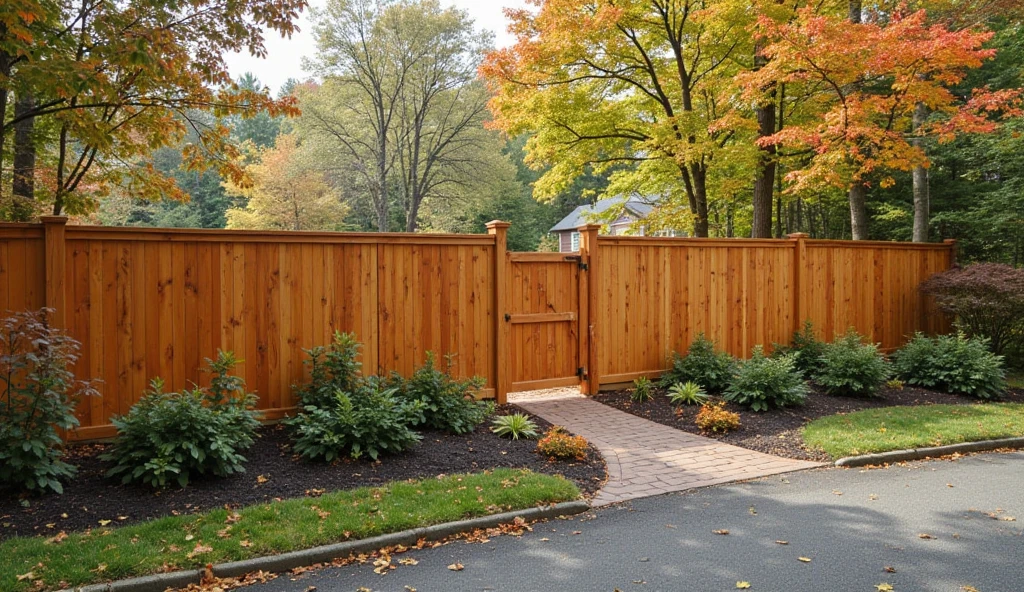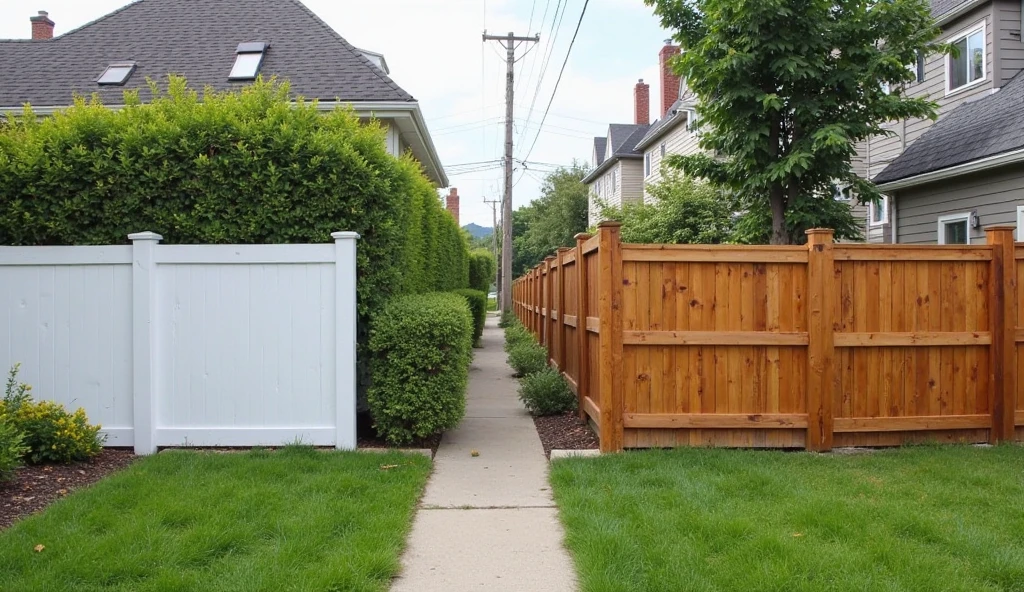Wooden fences provide a timeless elegance that effortlessly complements a variety of property styles, enhancing the natural charm of Massachusetts homes. Homeowners can personalize wooden fences with different wood types, heights, and finishes, tailoring the appearance to fit their specific tastes and property needs. The choice between treated and natural wood impacts longevity and maintenance. Treated woods, for example, often outperform their natural counterparts in durability, necessitating less frequent maintenance. According to a report published by the American Wood Protection Association, treated wood can last up to 40 years with minimal upkeep, underscoring its practical appeal.

Vinyl fencing is celebrated for its durability and resistance to common problems like rot and insect infestation, with warranties stretching up to 25 years. Vinyl fences present a low-maintenance option, requiring nothing more than an occasional rinse with soap and water to maintain their pristine appearance, making them ideal for Massachusetts homeowners with busy lifestyles. As noted by industry experts, vinyl fencing's popularity is rising, primarily due to its cost-effectiveness over time. This trend is evident in the market's steady growth, as homeowners increasingly prioritize long-term savings and ease of maintenance.
Chain link fences deliver an economical choice for delineating property boundaries, often chosen for commercial sites and substantial residential lots. These fences allow for high visibility while still offering security, making them the preferred option for parks and playgrounds. Their affordability is emphasized in cost analyses, which often show chain link fencing to be more budget-friendly compared to wooden and vinyl counterparts. This affordability, combined with their practicality, makes chain link fences an enduringly popular solution for cost-conscious property owners.
In Massachusetts, high-security fencing options, including barbed wire and electrified fencing, are specifically deployed for commercial and industrial applications to enhance safety. Installing high-security fences comes with a complex set of regulations and compliance requirements, highlighting the importance of adhering to industry standards like those set by the ASTM International. Professional installation is crucial to ensure that these fences serve their intended purpose effectively, providing maximum security and meeting all legal requirements necessary for safeguarding infrastructure projects.
Professional fence installers in Massachusetts ensure that your fence construction complies with state and local building codes, which significantly reduces the risk of facing penalties due to non-compliance. They are proficient in understanding and navigating these codes, so they handle all necessary paperwork efficiently, including obtaining permits. Data shows that non-compliance fines can be hefty, making adherence to regulations a cost-saving decision. By relying on professional installers, homeowners can avoid these potential fines and ensure their projects meet all regulatory requirements.
A professionally installed fence can enhance your property's curb appeal and resale value. In residential areas, privacy fences are particularly sought after, contributing to a sense of seclusion and peace within the property. Studies indicate that homes with well-maintained fences tend to sell at higher prices, as they are considered more attractive to potential buyers. Real estate professionals often cite that fencing can significantly impact a property's market value, making it a valuable investment for homeowners looking to increase their property’s worth.
Engaging professional installers offers the benefit of expertise in material selection and installation, which is crucial in Massachusetts's diverse climate. Professionals recommend the best materials suited for local weather conditions, minimizing future maintenance needs. Their precision in the installation process also decreases the likelihood of needing repairs or replacements. Many case studies demonstrate how successful material recommendations have prevented premature deterioration and led to longer-lasting fences, showcasing the value of their expertise in creating durable and aesthetically pleasing boundaries.
When selecting a fence installation provider, it is crucial to evaluate their credentials and customer reviews. Verify that they possess the necessary licenses and certifications, specifically for Massachusetts, to ensure they adhere to local regulations and quality standards. Customer reviews on platforms such as Yelp or Angie's List serve as valuable insights into a contractor's reliability and the quality of their service. For instance, a study by Consumer Reports highlights that 88% of customers are influenced by online reviews in their purchasing decisions, underlining the significant impact of feedback in contractor selection.
Understanding the pricing and service warranties is a key aspect of choosing the right fence installation provider. Obtain multiple quotes for comparison, ensuring each estimate provides a detailed breakdown of costs, including materials, labor, and any additional services. Warranties are also vital; they safeguard against construction faults or material failures. Industry standards often dictate warranty periods for wood fences to range between 1 to 2 years and 5 to 10 years for vinyl. These warranties provide not only financial value but also peace of mind, as they assure the quality and durability of the installed fence.
Hiring licensed and insured contractors is paramount in safeguarding your property during fence installations. Licensed professionals ensure that installations meet all local codes, thus protecting homeowners from potential liabilities due to non-compliance. Furthermore, insurance coverage is critical because it protects against damages or accidents that may occur during the fence installation process. According to HomeAdvisor, an estimated 10% of all home improvement projects encounter accidents, emphasizing the necessity of engaging insured contractors to prevent unforeseen expenses and liabilities.
Before embarking on any fence installation project in Massachusetts, it is crucial to check local zoning laws to avoid potential legal complications. Zoning laws can dictate everything from the height, placement, and type of fence allowed, varying significantly across municipalities such as Boston, Worcester, and Springfield. Understanding the permit application process is equally important, as failing to obtain necessary approvals can result in fines or forced removal of the fence. For instance, some towns might require detailed project plans or neighbor notifications. Ignoring these requirements could complicate your project. Ensuring compliance with these regulations not only protects against legal issues but also contributes to neighborhood harmony and adherence to local standards.
Surveying property lines is an essential step in fence projects to prevent disputes with neighbors over boundary violations. It’s vital to understand and respect property boundaries to avoid encroaching on public or communal lands. Using public resources, such as utilities or pathways without permission, can result in legal repercussions, including fines or mandated removal of any structures placed unlawfully. Case studies have shown that disputes over property lines can lead to prolonged legal battles. Such cases highlight the importance of not only knowing your property limits but also respecting community resources and infrastructure during any construction process.

In Massachusetts, certain fencing types must adhere to safety standards, particularly those that may impact public areas or obstruct visibility. Community guidelines often specify not just the permissible height and design of fences in residential areas but also their materials and distance from public pathways. For example, some communities might restrict barbed wire or electric fences in residential zones. These community guidelines help maintain a consistent aesthetic in neighborhoods and ensure safety for residents and passersby. Being aware of and complying with these standards prevents potential violations and supports community well-being, ensuring that your fencing project is both safe and compliant with local expectations.
Wooden, vinyl, and chain-link fences are among the most popular in Massachusetts, each offering unique benefits such as customization, durability, and affordability.
Professionals ensure compliance with local codes, provide expert material recommendations, and enhance your property's value, while safeguarding against legal and installation issues.
Legal considerations include adhering to zoning laws and permits, ensuring property line surveys, and following community guidelines to avoid fines or disputes.